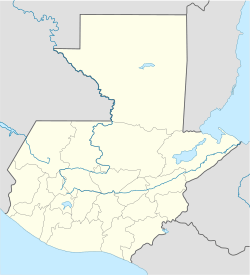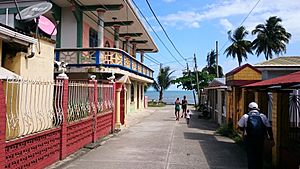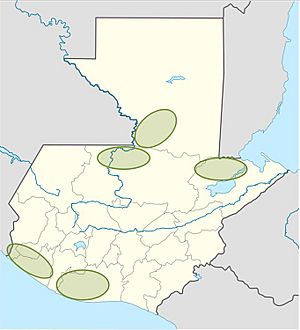Livingston, Guatemala facts for kids
Quick facts for kids
Livingston
Labuga
|
|
|---|---|
|
Municipality and town
|
|
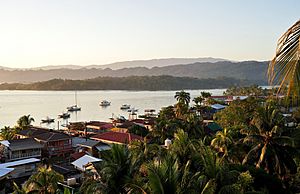
Panoramic
|
|
| Country | |
| Department | Izabal Department |
| Area | |
| • Total | 919 sq mi (2,379 km2) |
| Population
(2018 census)
|
|
| • Total | 73,492 |
| • Density | 80.010/sq mi (30.892/km2) |
| Climate | Af |
Livingston is a lively town located in eastern Guatemala. It has a population of about 17,923 people (as of 2018). You can find it at the mouth of the Río Dulce, right where it meets the Gulf of Honduras. This town is the main center for the area around it.
Livingston used to be Guatemala's most important port on the Caribbean Sea. That was before the nearby port of Puerto Barrios was built. What makes Livingston special is its amazing mix of cultures. You'll find Garífuna, Afro-Caribbean, Maya, and Ladino people living together. In recent years, many tourists have started visiting Livingston because of its unique charm.
Contents
History of Livingston
Livingston got its name from an American lawyer and politician named Edward Livingston. He created a set of laws known as the Livingston Codes. These laws were later translated into Spanish and used as a guide for the government of the United Provinces of Central America in the early 1800s.
The Northern Transversal Strip
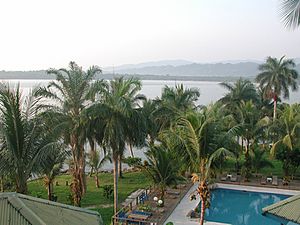
In the 1960s, an important area called the Franja Transversal del Norte (which means "Northern Transversal Strip") became known for its cattle farming, valuable wood for export, and ancient archaeological sites. Companies were given permission to cut down trees in this region.
To help people move into and settle this area, the government started a program in 1964. They helped families from other parts of Guatemala move to these less populated areas. The Northern Transversal Strip was officially created in 1970 to help with farming and development. It included parts of several departments, including Izabal Department, where Livingston is located.
Livingston's Economy
African Palm Oil Production
There's a big need for cooking oils and fats in Guatemala and nearby countries. This is why African palm oil has become very popular. New companies are investing a lot to grow palm oil, especially in the Northern Transversal Strip. They hope to make Guatemala one of the main countries that exports palm oil, even if its price changes.
Areas like El Estor and Livingston in Izabal Department are important for palm oil production.
Getting Around Livingston
Livingston is unique because you can only reach it by water! There are no roads connecting it to the rest of Guatemala.
- By Boat: Boats travel several times a day from Puerto Barrios. You can also catch a boat from Punta Gorda, Belize on Tuesdays and Fridays. Boats also go from Livingston to Punta Gorda every morning.
- River Tours: There's also a boat that takes tourists from Livingston through the beautiful Río Dulce every day.
When you arrive in Livingston from another country, you need to show your passport at the customs office. It's important to do this to avoid problems when you leave Guatemala later.
Languages Spoken in Livingston
Many different languages are spoken in Livingston, showing its diverse culture:
- Spanish
- Garifuna language
- Mayan Qʼeqchiʼ
- English
Famous People from Livingston
Livingston is home to some talented athletes:
- Guillermo Ramírez, a footballer for Municipal, C.S.D. in the Guatemalan Football League.
- Marvin Ávila, a footballer who played for Shaanxi Neo-China Chanba F.C.
- Ricardo Trigueño, a footballer for Deportivo Petapa in the Guatemalan Football League.
Livingston in Movies
The New Adventures of Tarzan (1935)
In 1935, parts of the movie The New Adventures of Tarzan were filmed right here in Guatemala! They got help from a company called the United Fruit Company and the president at the time, Jorge Ubico.
Terminator: Dark Fate (2019)
Livingston also made a brief appearance in the 2019 movie Terminator: Dark Fate. In an early scene, Sarah Connor and her teenage son John were hiding out in Livingston in 1998, after the events of the second Terminator movie.
Livingston's Climate
Livingston has a tropical rainforest climate. This means it's usually hot and rainy all year round.
| Climate data for Livingston | |||||||||||||
|---|---|---|---|---|---|---|---|---|---|---|---|---|---|
| Month | Jan | Feb | Mar | Apr | May | Jun | Jul | Aug | Sep | Oct | Nov | Dec | Year |
| Daily mean °C (°F) | 23.7 (74.7) |
24.5 (76.1) |
26.0 (78.8) |
27.4 (81.3) |
28.0 (82.4) |
28.0 (82.4) |
27.6 (81.7) |
27.7 (81.9) |
27.6 (81.7) |
26.6 (79.9) |
25.0 (77.0) |
24.1 (75.4) |
26.4 (79.4) |
| Average precipitation mm (inches) | 212 (8.3) |
125 (4.9) |
105 (4.1) |
131 (5.2) |
202 (8.0) |
433 (17.0) |
621 (24.4) |
486 (19.1) |
431 (17.0) |
346 (13.6) |
313 (12.3) |
231 (9.1) |
3,636 (143) |
| Source: Climate-Data.org | |||||||||||||
Where is Livingston Located?
 |
Belize |  |
||
| Chahal and Cahabón, municipalities of Alta Verapaz Department | Lago de Izabal, Río Dulce and Puerto Barrios, municipality of Izabal Department | |||
| El Estor, municipality of Izabal Department | Lago de Izabal |
See also
 In Spanish: Livingston (Izabal) para niños
In Spanish: Livingston (Izabal) para niños


